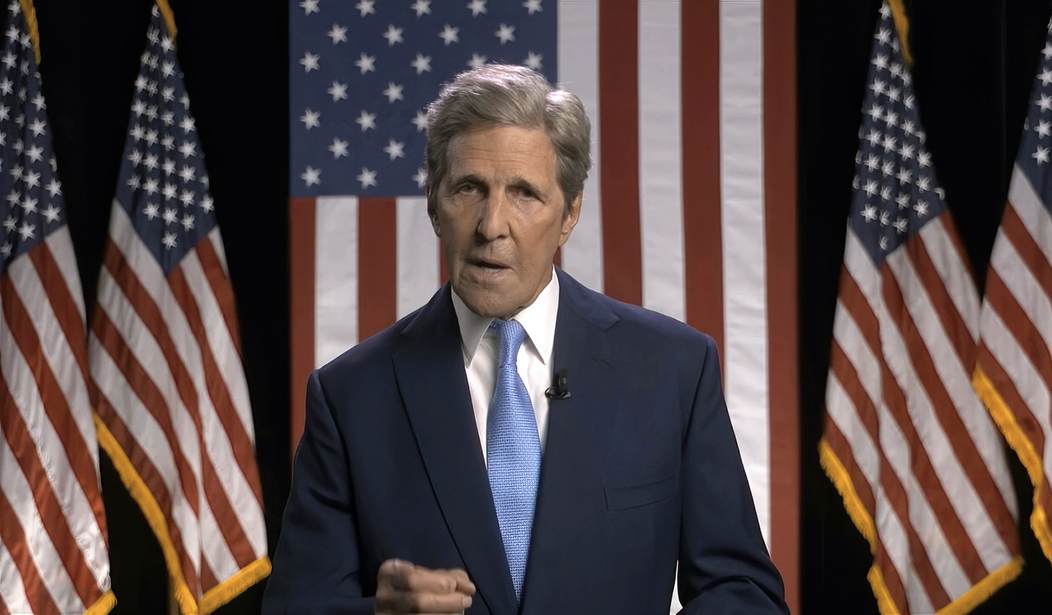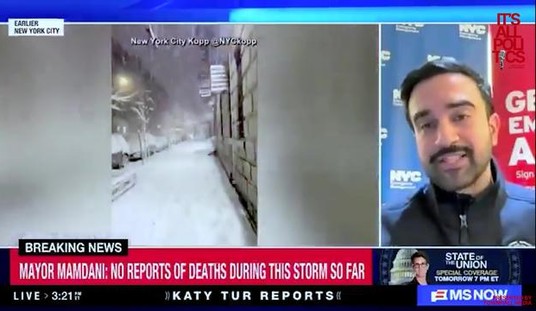A truly fascinating story broke on Sunday in the New York Times, but readers had to get to the 21st paragraph of a 25 paragraph story to find a key detail about John Kerry.
During the Trump Administration, Kerry informed the Iranian Foreign Minister, Mohammad Javad Zarif, that Israel had been attacking Iranian “interests” — military targets — in Syria throughout the Trump Administration.
Former Secretary of State John Kerry informed him that Israel had attacked Iranian interests in Syria at least 200 times, to his astonishment, Mr. Zarif said.
That one sentence is the only reference in the story about John Kerry, although there may be a reason for that as explained below.
But this is the same newspaper that spent the better part of four years excoriating the Trump Administration and Ret. General Michael Flynn over a telephone call with the Russian Ambassador a few weeks before Flynn became the National Security Advisor. John Kerry was nothing more than a private citizen at the time of his communications with the Iranian Foreign Minister, with no plan or expectation that he would ever have another position in the government that would bring him into official contact with the Iranian Foreign Minister.
The NYT story is not about meetings or discussions between former Obama Administration officials and their friends in the Iranian Government. Rather, it is a fascinating story about a tape-recorded conversation between Zarif and an economist named Saeed Leylaz, an ally inside Iran. Zarif discusses with Leylaz many aspects of his role as Foreign Minister, and the fact that in the structure of the Iranian government, his efforts through diplomacy were always constrained by the wishes of the Iranian military, including Maj. Gen. Qassim Suleimani, the commander of the Iranian Revolutionary Guard’s elite Quds Force, the foreign-facing arm of Iran’s security apparatus, who was killed by the United States in January 2020. Zarif’s recorded comments were in many ways critical of Suleimani:
The general, Mr. Zarif said, undermined him at many steps, working with Russia to sabotage the nuclear deal between Iran and world powers and adopting policies toward Syria’s long war that damaged Iran’s interests.
“In the Islamic Republic the military field rules,” Mr. Zarif said in a three-hour taped conversation that was a part of an oral history project documenting the work of the current administration. “I have sacrificed diplomacy for the military field rather than the field servicing diplomacy.”
Mr. Zarif said Russia did not want the agreement to succeed and “put all its weight” behind creating obstacles because it was not in Moscow’s interests for Iran to normalize relations with the West. To that end, Mr. Zarif said, General Suleimani traveled to Russia to “demolish our achievement,” meaning the nuclear deal.
According to the Times, the tape was not meant for public release when it was first leaked to London-based Persian news channel Iran International. Zarif’s recorded comments have voices in Iran calling for Zarif’s resignation.
By Sunday night, Mr. Zarif’s critics were calling for his resignation, saying he had threatened Iran’s national security by revealing to the world the country’s inner politics. Even his supporters expressed concern that the comments could influence the presidential elections in late June and harm candidates from the reform faction, which Mr. Zarif is associated with, by reinforcing voter apathy and the idea that elected officials are not really in charge.
One important disclosure made by Zarif was the fact that the decision by Pres. Trump to kill Gen. Suleimani in January 2020 struck a massive blow to the Iranian military and government, as we noted earlier.
[Zarif] also says that by assassinating him in Iraq, the United States delivered a major blow to Iran, more damaging than if it had wiped out an entire city in an attack.
The Times quotes analysts as suggesting that the release of Zarif’s comments has done great damage to the efforts to renew discussions between US and Iranian diplomats aimed at resurrecting the agreement between Iran and western governments on Iran’s pursuit of nuclear weapons.
Some analysts said the audio would undermine Iranian diplomats’ authority at a sensitive window of the negotiations.
“This ties the hands of the negotiators,” said Sina Azodi, a nonresident fellow at the Atlantic Council. “It represents Zarif as someone who is not trustworthy domestically, and overall paints a picture that Iran’s foreign policy is dictated by theater policies of the military and Zarif is a nobody.”
“The structure of our foreign ministry is mostly security oriented,” Mr. Zarif said.
Mr. Zarif said he was kept in the dark on government actions — sometimes to his embarrassment.
That analysis seems to imply that Israel might have played some role in the tape being released. If that is true, it would be the second instance of Israeli action — following its attack on the Natanz nuclear site last week which did significant damage to the secret facility built 50 meters underground by Iran to prevent it from being attacked by conventional weapons.
The Biden Administration had no warning of the attack on the Natanz site, and it likely had no knowledge that this tape would surface and undercut the Iranian diplomat who was expected to be the negotiating counterpart for Secretary of State Anthony Blinken in upcoming talks with Iran over returning to the terms of the previously agreed-upon deal over nuclear weapons.
Given the overall tenor of the story and the significance of the tape’s release independent of the reference on the tape to Kerry, it is not surprising that the single reference to Kerry’s actions is buried at the bottom of the story. The NYT knew Zarif’s comment about Kerry would make its way into foreign media, so it covered the reference but provided no context or background to explain it.
But that doesn’t make the fact that Kerry betrayed a key US ally — Israel — to a hostile foreign actor in conversations while he was a private citizen.
Kerry may not be an antisemite, but he is certainly no friend of the Conservative Government led by Prime Minister Benjamin Netanyahu. As was widely reported in 2015 and 2016, the Obama Administration State Department assisted non-profits and non-governmental organizations in efforts to defeat Netanyahu’s election effort in 2015.
“The State Department people in the end of January, early February, expedited visas for [Israeli] Arab leaders to come to the United States to learn how to vote,” McLaughlin said.
“There were people in the United States that were organizing them to vote in one party so they would help the left-of-center candidate, Herzog, that the Obama administration favored,” he added.
Already tense relations between Obama and Netanyahu escalated this week after Netanyahu’s pre-election promise to not allow a Palestinian state. He later backed down after White House criticism, though Obama suggested in an interview released Saturday he wouldn’t brush off the comments.
“They were running an ACORN, Obama Organizing for America-type campaign over there with the digital ads, the billboards, the phones. They were targeting Israeli voters,” Rep. Lee Zeldin (R-N.Y.) said Saturday on Fox News’s “Justice with Judge Jeanine.”
“I think the president, Tuesday night, felt like he lost,” said Zeldin, who along with Sen. Ted Cruz (R-Texas) has questioned the Obama administration over OneVoice’s funding and nonprofit status.
John Kerry was Secretary of State when the operation to get Netanyahu defeated was undertaken.
How much damage this story might actually do to Zarif’s standing in the Iranian government remains to be seen. But the Biden Administration understands today that it will likely need to seek out another willing advocate on the Iranian side for a return to the bargaining table.
And that Israel is prepared to take whatever steps it deems necessary — in its own interests — to prevent that from happening.















Join the conversation as a VIP Member